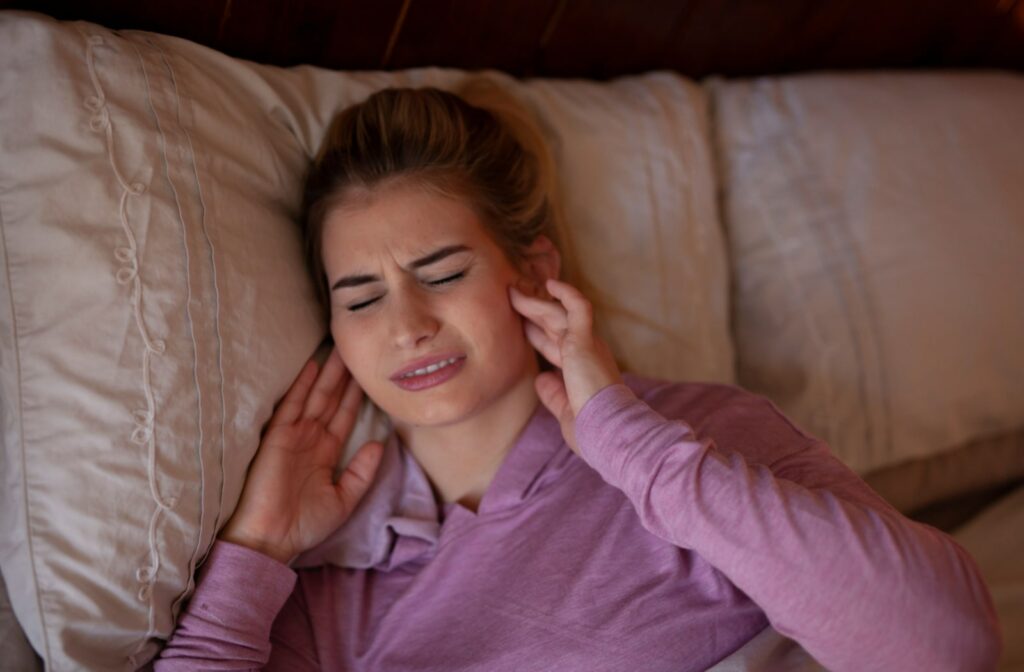Are you experiencing tooth pain from grinding? Do you wake up with a sore jaw or sensitive teeth? If so, you’re not alone. Teeth grinding, or bruxism, typically happens at night, and the Canadian Sleep Society estimates it affects about 8% of adults and 14% of children.
Fortunately, there are ways to relieve tooth pain from grinding, such as wearing a mouthguard and practicing relaxation techniques to reduce stress. It’s also important to schedule regular dental exams to monitor your and your family’s oral health since prolonged grinding can lead to damage.
Why Do People Grind Their Teeth?
Various factors in your life can cause tooth grinding, so it’s important to focus on managing your overall well-being. It can be challenging to recognize if grinding is the cause of your tooth pain, as some people grind their teeth during sleep while others grind during the day without even realizing it. Here are some of the most common reasons why people grind their teeth:
- High stress or anxiety
- Lack of sleep
- Misaligned or crooked teeth
- Missing teeth
You may also grind your teeth if you smoke, drink alcohol, or do recreational drugs.
Signs & Symptoms of Tooth Grinding
Signs of grinding are typically subtle at first and might be limited to soreness that fades away over time. If you grind your teeth at night, you’ll probably notice aching when you wake up that may fade by lunchtime. However, prolonged grinding can lead to discomfort and damage, including:
- Facial pain & stiffness
- Head & ear aches
- Sensitive teeth
- Loose teeth
- Chipped or broken teeth
If you are experiencing any of these symptoms, especially if you notice a broken tooth, you should talk to your dentist as soon as possible. They can help you identify the underlying cause, which can be helpful since many people might be unaware they grind their teeth.
Finding Relief from Tooth Grinding Pain
If you’re dealing with tooth pain from grinding, relief comes in two steps. One is treating the immediate pain and symptoms, while the second is preventing yourself from grinding in the first place.
Treating Tooth Pain
Over-the-counter pain medication, such as ibuprofen and acetaminophen, can offer pain relief but typically aren’t long-term solutions. Since grinding can also cause your jaw to tense up, you can apply a heating pad to your jaw to help dissipate the tension built up in the muscles.
Facial massages and stretching exercises can help loosen tense muscles, potentially easing the ache that comes with grinding. However, don’t overdo it. If your jaw tissue is injured, an aggressive massage might result in you injuring yourself further.
Preventing Tooth Grinding
Ideally, you shouldn’t have to deal with tooth pain in the first place, so your dentist can offer solutions to stop you from grinding your teeth.
One of the best prevention methods for night grinding is a custom mouthguard that creates a barrier between your upper and lower teeth. By taking a mould of your teeth, your dentist can make an appliance you can wear while you sleep to reduce nighttime grinding.
You can also take steps to reduce your stress and anxiety since they can cause you to clench your teeth, even when you sleep. Try to find relaxation techniques to lower your stress, such as meditation, deep breathing exercises, or yoga. You should also eat a balanced diet and stay active with walks or exercise.
What helps you unwind is personal, so try a few different ways to relax before bed.
If your grinding is due to crooked or missing teeth, your dentist might offer treatments to address these issues, such as dental implants, crowns, or bridges.
A Healthy Smile for the Whole Family
Teeth grinding is a common issue, but it can lead to big problems. A family member or friend will likely notice you’re grinding before you do, and when they let you know, it means they care about your dental health.
If you, or someone else, has noticed you’re grinding your teeth, book a check-up with our friendly team at Hill Top Dental Centre and take a moment to relax.



